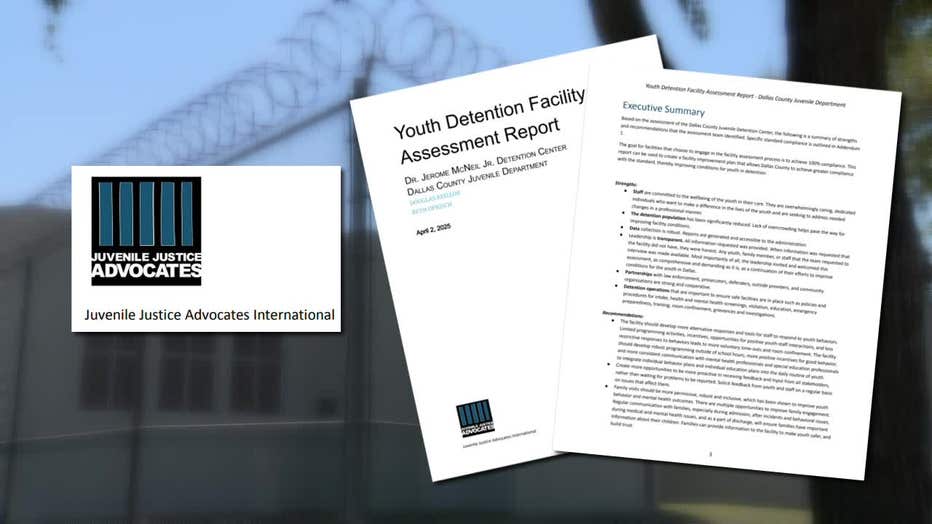Report gives in-depth evaluation of Dallas County juvenile department
Report evaluates Dallas Co. juvenile department
State inspectors paid an unannounced visit to the facility in July, prompting then director Darryl Beatty to resign. The visit also prompted the Texas Office of the Inspector General to open a new investigation into the facility.
DALLAS - The Dallas County juvenile department has undergone an in-depth evaluation of how it handles detainees by an independent juvenile justice advocacy group.
This follows complaints about the mistreatment of juveniles under the department’s previous leadership.
Dallas County Juvenile Justice Failures

The backstory:
The department came under fire after a whistleblower reported inhumane conditions inside the Dallas County Juvenile Justice Center.
State inspectors paid an unannounced visit to the facility in July, prompting then director Darryl Beatty to resign. The visit also prompted the Texas Office of the Inspector General to open a new investigation into the facility.
A report released in September found a program called the Special Needs Unit that operated without policy or procedure. The practice allowed the facility to circumvent state standards.
Multiple juveniles were confined to their rooms, sometimes 24 hours a day, without access to education, exercise, or showers. The result was systematic neglect that staff, educators, and administrators were aware of.
Inspectors also found what could be criminal -- pervasive falsification of documents as it related to observation checks. By state law, those must happen every 15 minutes overnight when residents are in their rooms. The checks did not happen.
Lynn Hadnot took over as the new director of the juvenile department earlier this year with the goal of turning things around.
Assessment Report

What's new:
Dallas County Commissioners approved a third-party review of the department at the request of Interim Director Mike Griffith before Director Hadnot took over two months ago.
"There are a number of things that we’re doing okay in. But there’s also significant work to be done," Hadnot told FOX 4 in an interview on Friday. "Beginning with just core services in terms of humane treatment, changing the culture here in this facility. There were a number of practices that are very well documented in terms of the youth and how they were treated here."
Juvenile Justice Advocates International’s evaluation included classification and intake, health and mental health, family engagement, programming, employee training and supervision, and restraint and room confinement.
Detainees in the past were being held behind "the door," or solitary confinement, for extended hours and even days.
Hadnot called that the elephant in the room that gave him the biggest heartburn.
"Solitary confinement is one of the things that I’ve heard consistently. Are you guys going to adhere or be subjecting our youth to solitary confinement? The answer is an unequivocal no," he said.
The report also recommended improved family engagement, from decisions that have to be made about a youth to how loved ones can visit them.
Hadnot said the department is trying to secure grand dollars to make visits more personal.
"Bring in some new technology that will help us provide some very complex scanning that will allow families to come in. We can mitigate risk with contraband and maybe look at putting some policies in place where we can have contact visitation in the very near future," he said.
While the state has roughly 200 minimum standards for juvenile facilities, Juvenile Justice Advocates International has almost 500 minimum standards.
The head of the group said its standards are considered the highest for youth detention in the United States, adding any facility that engages in this assessment process is demonstrating a desire to do the best for children in their care.
Hadnot is glad to have the assessment tool with its many recommendations.
He believes it will help make the department what it’s supposed to be.
"We could have very well just said we’re going to adhere to the minimum standards as required by the Texas administrative code. But we are striving collectively again to by far exceed what the state would have us do in providing care for kids and families here in Dallas," he said.
The assessment gives Hadnot a gauge for the department.
Staffing is still a problem. But one thing he shared is that there are many employees who have stayed for the right reason, and that is they want to help kids.
He said he is most proud of that.
The Source: FOX 4 reporter Shaun Rabb gather details for this story by interviewing Director Lynn Hadnot, as well as past news coverage.


